

Politics for Munich.
The Businessman Moritz Guggenheimer (1825–1902)
Munich 1870. With a large majority, the highly respected businessman Moritz Guggenheimer was the first Jewish resident of Munich to be elected Chairman of the “Kollegium der Gemeindebevollmächtigten”—the council of locally elected delegates. This was a pivotal signal for the emancipation of Jews in Bavaria. Many contemporaries also saw the significance of this nomination.
For more than a decade Moritz Guggenheimer was to participate in determining the fortunes of Munich and complete or instigate important local infrastructure projects, such as the construction of the…
Politics for Munich.
The Businessman Moritz Guggenheimer (1825–1902)
Munich 1870. With a large majority, the highly respected businessman Moritz Guggenheimer was the first Jewish resident of Munich to be elected Chairman of the “Kollegium der Gemeindebevollmächtigten”—the council of locally elected delegates. This was a pivotal signal for the emancipation of Jews in Bavaria. Many contemporaries also saw the significance of this nomination.
For more than a decade Moritz Guggenheimer was to participate in determining the fortunes of Munich and complete or instigate important local infrastructure projects, such as the construction of the slaughterhouse and stockyard, the waterworks, and the extension of the sewerage system. Anti-Semitic attacks ultimately prompted Guggenheimer to pull out of politics in 1881.
A previously unknown portrait by Franz von Lenbach, gifted to the Jewish Museum Munich by the family, forms the focal point of this presentation and commemorates the politician, Guggenheimer, and his contribution toward Munich’s development into a modern, cosmopolitan city.
Duration of exhibition
April 2 - October 4, 2014
Where
Study Area
Curator
Andreas Heusler, Stadtarchiv München
PUBLICATION


![[Translate to Englisch:] Politik für München – Moritz Guggenheimer [Translate to Englisch:] Politik für München – Moritz Guggenheimer](/fileadmin/redaktion/03_Museum/Publikationen/JMM_Museum_Publikationen_Studienraum_Politik_fu__r_Mu__nchen.png)